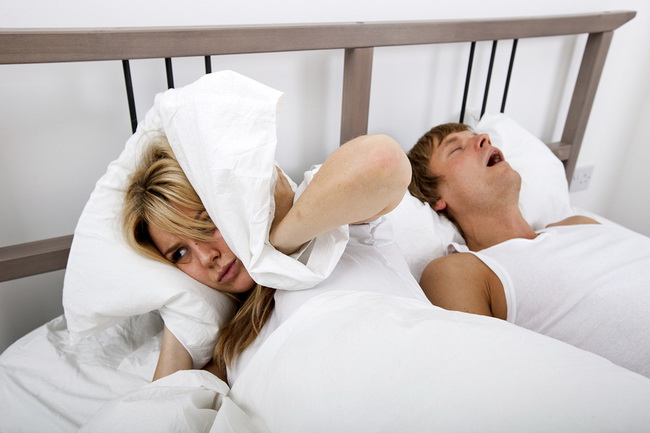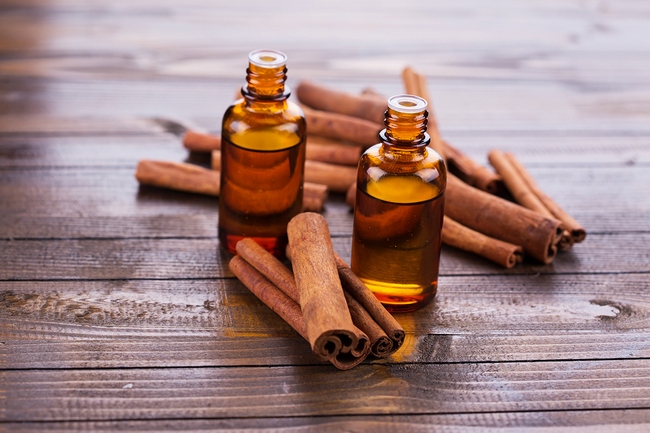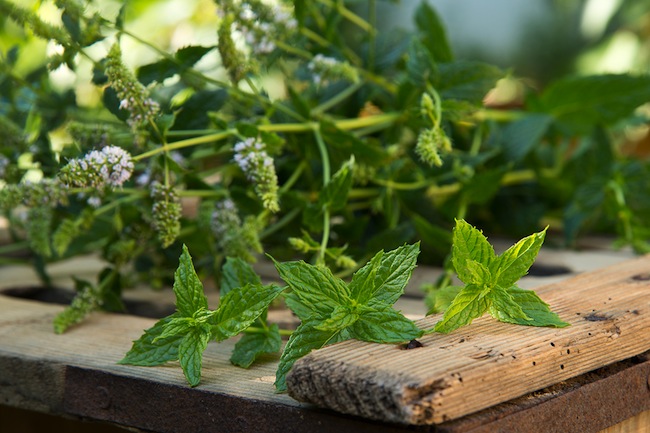- Make It Yourself Lavender Heart-Shaped Bath Bombs!
- 20 Things You Never Knew About “Down There”
- 12 Best Foods For Those Suffering From Arthritis Pain
- 12 Personal Hygiene Mistakes Almost Everyone Makes (Mom Never Told You About #4!)
- 15 Medicinal Plants And Herbs From The Cherokee People
- 12 Mind-Blowing Benefits Of Drinking Coconut Water During Pregnancy
- 12 Outstanding Winter Foods That Won’t Fatten You Up Like A Christmas Turkey
12 Ways to Beat Sleep Apnea Without Machines (#8 is Fun!)

Photo credit: bigstock.com
If you or someone in your family suffers from sleep apnea, you know how annoying and scary it can be. You might have it and not even be aware of it! Sleep apnea is a fairly common sleep disorder. While the person is sleeping, their breathing will suddenly stop, sometimes for just a few seconds, other times for as long as a minute! This occurs because of narrowed or blocked airways or when the brain fails to transmit the proper signals to your respiratory system.
This sleep disorder affects about 18 million Americans, according to the National Sleep Foundation. Although this can affect anyone, it tends to affect men more than women, especially Hispanic and African-American males.
Sleep apnea is no joking matter. If left untreated it can lead to serious health problems, including heart disease, stroke, diabetes, high blood pressure and depression.
Common symptoms are poor sleep quality, sleepiness during the day, waking up gasping for air, headaches in the morning, dry mouth, insomnia, attention and concentration problems, as well as severe snoring.
If you are like most people, you are not interested in using the CPAP machine. This mask, which pushes air into the nasal passages, does enable easier breathing, but how many people learn to sleep well with a mask on their face? Not to mention the “SO NOT SEXY” factor.
Try some of the following treatment methods to relieve sleep apnea, so you don’t have to rely on a machine for breathing.
1. Almonds
This sounds too simple to be true, but almonds are one tasty way to help improve sleep apnea symptoms. These nuts are high in magnesium, which stimulate sound sleep and muscle relaxation. When the airways are relaxed, you can breathe more easily. Try eating 1 ounce (about a handful) of almonds each day or try some almond butter about an hour before bedtime.
2. See a Chiropractor
Most people who suffer from this sleep disorder have problems in their upper cervical spine, and sometimes even problems with the lower spine. When your spine is out of alignment, it compresses the nerves, interrupting signals between the brain and the respiratory system. A typical problem for those with sleep apnea is that the head is shifted forward more than it should be, which puts stress on the airways. See a chiropractor and explain that you have sleep apnea. They can recommend exercises and take the necessary steps to help put things back in alignment.
3. Honey
Another tasty way to beat this sleep disorder! Honey is full of anti-inflammatory compounds that reduce the swelling in the throat that can obstruct breathing. Honey will also lubricate the throat, which will help to prevent snoring, one of the most common symptoms of this disorder. Honey encourages relaxation and promotes healthy sleep patterns. Add one tablespoon of raw honey to a glass of water and drink about one hour before bedtime. Read more how to choose the right honey.
Continue to Page 2

Photo credit: bigstock.com
4. Cinnamon
This spice has been used in Ayurvedic medicine for hundreds of years as a sedative, which can encourage better sleep and help to treat breathing problems. Make your own cinnamon tea by mixing one tablespoon of grated ginger and one cinnamon stick to one cup of water. Boil for 5 minutes, strain and cool. Add a teaspoon of honey and drink each night about one hour before bed. An alternate method is to make a paste using two teaspoons of cinnamon powder and a bit of water. Apply this paste to your chest, throat and forehead. Allow to penetrate for about five minutes, and then rinse off with water. Do this each night just before bedtime for best results.
5. Try a New Pillow
There are numerous pillows for sale that will position the head and neck so that the airways remain open and clear, allowing for easier breathing. These are available online or in many medical device locations that sell other items such as crutches or wheelchairs.
6. Garlic
This is a great home remedy for treating sleep apnea. Garlic has anti-inflammatory compounds that reduce inflammation in the respiratory system, which will improve breathing. Garlic will also prevent snoring by helping alleviate enlarged tonsils. Crush two cloves of fresh, organic garlic and allow it to sit for a few minutes, and then swallow them whole. Follow with a full glass of water. Do this once each day until your symptoms improve. Find out more about garlic benefits.
Continue to Page 3

Photo credit: bigstock.com
7. Turmeric
Milk is loaded with an amino acid called tryptophan that encourages sleep. Turmeric is a powerful anti-inflammatory that can reduce inflammation in the airways, which will help you breathe more freely. This combination is a potent, but completely natural, way to help fight sleep apnea. Mix a teaspoon of turmeric powder with one cup of whole milk. Bring to a boil, and then simmer on low for one minute. Remove from the heat, and add a teaspoon of honey if you like. Drink this 30 minutes before bedtime for best results.
8. Throat Exercises
Strengthening the muscles in and around the throat area can keep airways open so you breathe freely at night. This will reduce snoring and other breathing problems.
- Play with a kazoo (sometimes called a didgeridoo) five or six times a week for 20 to 25 minutes at a time.
- Say the alphabet out loud. Be sure that you exaggerate each sound. Open your mouth wide and make your mouth and throat muscles really work to make these sounds. Do this two or three times each day.
- Get a couple of balloons. Blow them up by inhaling through your nose and then exhaling through your mouth. Try not to remove the balloon from your mouth and keep going as long as you can or until the balloon is about to pop. Blow up three or four balloons each day.
9. Epsom Salt Soak
Many naturopaths use this method to help improve sleeping patterns. Epsom salt is actually just magnesium flakes, which relax muscles and create an overall feeling of well-being. Epsom salt will also reduce inflammation throughout the body. To try this method, simply add two cups of Epsom salt in a bath filled with very warm water and mix well. Soak in this bath for 20 to 30 minutes at least an hour before bedtime. Do this three or four times each week for best results.
Continue to Page 4

Photo credit: bigstock.com
10. Peppermint
Peppermint is another herb with anti-inflammatory compounds that will help soothe irritated airways and encourage easier breathing. You can drink two or three cups of peppermint tea each day, or add three drops of peppermint essential oil to a glass of water and gargle with it twice each day.
11. Lavender
Lavender has very soothing, sedative compounds which will relax the muscles in the throat and mouth, allowing for higher quality sleep. Lavender has been used for eons to promote better sleep. Add a few drops of lavender essential oil to a bath and enjoy a soak before bedtime. Alternately, you can add a few drops of lavender oil to a pot of steaming hot water and breathe in the steam about 30 minutes before bed. You can also put lavender oil in a diffuser so that you breathe in this relaxing scent all night long.
SEE ALSO: The 8 Sleeping Positions That Can Hurt or Help Your Health!
12. Chamomile
This is another effective herb that has been used for thousands of years to promote deeper sleep. Chamomile has compounds that relax both the muscles and nerves. It is a mild sedative that also has anti-inflammatory compounds that can relax and soothe the airways. Drink a strong cup of chamomile tea about an hour before bedtime. Another way to use this herb is to mix one part chamomile oil and two parts olive oil or grape seed oil and massage this into your neck and chest each twice each day to relax the muscles in the neck and respiratory system.
Extra Tips:
- Avoid sleeping on your back. Sew a tennis ball into the back of a pajama top so you will turn on your side to sleep.
- Avoid heavy meals and caffeine at least two hours before bedtime.
- If you are overweight, aim to lose at least five percent of your body weight to improve breathing.
- If you smoke, stop.
- Be sure you get plenty of vitamin C to improve the communication pathway between the brain and the respiratory system.
- Get at least 30 minutes of moderate exercise five to six days each week.
References:

































Robert Olson
May 18, 2018 at 5:43 am
I treated my sleep apnea naturally using this excellent program I found here